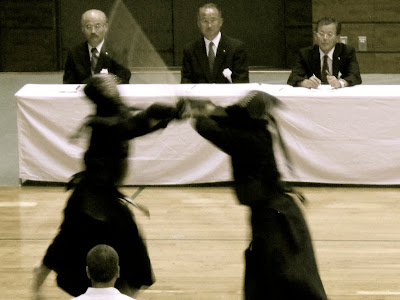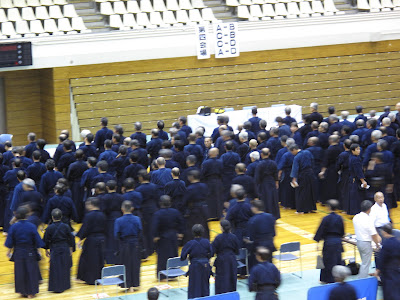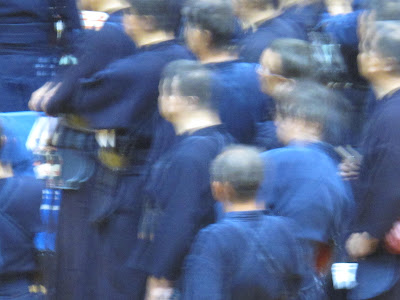
六段 | 七段 — 6º e 7º Dan:
tarde de exames, Domingo 29/08/2010.

Pelas nove da manhã de Domingo, o Ginásio Municipal de Fukuoka está já repleto de homens e mulheres de idades genericamente compreendidas entre os trinta e os sessenta e muitos anos de idade, envergando impecáveis vestes azul-indigo — uma restrita minoria opta pelo branco —, ajoelhados em vários pontos do recinto, dispõem-se isoladamente ou em pequenos círculos, inspeccionando e cuidando, com escrupulosa atenção, os respectivos shinai e bogu, os mesmos que irão usar em prova, reclamando especial zêlo.
São-no às centenas. Largas centenas.
Vêm de todo o Japão e além-ilhas.
Trazem consigo familiares e amigos, e há nos seus rostos e linguagem corporal um misto de nervosismo, desprendimento e aquilo que, em certos casos, se poderia confundir com uma certa ideia de resignação.
Alguns estarão ali, porventura, pela segunda, terceira, quarta ou mais vezes e com o mesmo propósito das ocasiões que, ali, anteriormente os trouxeram: hoje é dia de provas — Kenshi titulares do Go-Dan [五段 — 5º Dan] e Roku-Dan [六段 — 6º Dan] propõem-se obter o 6º e 7º Dan, respectivamente. Tarefa ingrata. Vai ser, para alguns, um dia completo de sofridas prestações.

Foi, para mim, a primeira vez que vim assistir a Shiken [試験 — testes/exames] destinados ao reconhecimento e atribuição de tão elevados graus de competência na modalidade. E confesso que fiquei perplexo com algumas constatações: não obstante o notório nível de dedicação e exemplar qualidade combativa da grande maioria dos convocados, o número de reprovações, logo na primeira fase de provas é surpreendentemente elevado.
Que não sobejem equívocos: isto não é para qualquer um. E que custa, oh! se custa.
Custa muito.
Talvez eu tivesse permanecido, até hoje, sugestionado pela impressão — quiçá comum entre amantes do Kendo, menos experimentados — que difícil, difícil, custoso, custoso, e para tantos de nós virtualmente impossível de obter, seria só esse quimérico, quase-mitológico Hachi-Dan [八段 — 8º Dan] reservado a menos de 1% dos praticantes, só no Japão e entre os seus quase cinco milhões de adeptos no país de origem, e até hoje inacessível a qualquer entusiasta de além-ilhas.
Reconheço que foi uma experiência por demais elucidativa, a deste Domingo.
Dispensei o remanescente da manhã e tarde do dia a colher retratos, como é já meu hábito destas coisas.
Ao proceder ao upload do vasto manancial de imagens captadas ao longo da minha extensa observação in loco, calha-me, entretanto, em mãos uma obra que tenho por primaz referência na apreciação destes ensinamentos e seus afins: o "Hagakure Nyumon — 葉隠入門 — Introdução /Comentário ao 'Hagakure'" de Mishima Yukio, o próprio um dedicado Kenshi, autor de renome e connoisseur reverenciado destes assuntos...

Tomo, pois, umas quantas passagens de empréstimo à obra escolhida com o fito de 'ilustrar' esta longa colecção de postais-ilustrados, e por modo a tornar a vossa apreciação da mesma um pouco mais aprazível. Ou digerível; consoante as disposições.
Umas quantas notas soltas e não necessariamente afectas ao tema do Kendo.

A título de nota final, esclareço que as passagens que se seguem, por mim seleccionadas do "Hagakure Nyumon" — recorrendo para o efeito à edição inglesa que trago entre mãos — não correspondem necessariamente, na parte ou no todo, à minha minha perspectiva pessoal no que concerne ao tema ou temas abordados nas mesmas, discriminando-as tão-só enquanto excertos da obra em causa que suscitaram o meu pontual interesse aquando de uma leitura mais recente.
E recordando que, se me não falha a memória, como nos ensinava Descartes, ler é discutir, é assim, sem nunca abdicar do mais elementar espírito crítico que me apraz trazer estas considerações à ordem do dia. Para que possais ajuizar e dizer de vossa sentença.
A conversar entendemo-nos.
Alea jacta est.
(...) One may measure the stature of a person's dignity [尊厳 — songen] on the basis of external impression. There is dignity in assiduity and effort. There is dignity in serenity. There is dignity in closeness of mouth. There is dignity in observing proper etiquette. There is dignity in behaving always with propriety. There is great dignity too in clenched teeth and flashing eyes. All these qualities are externally visible. The most important thing is to concentrate on them at all times and to be totally sincere in displaying them.
(“Hagakure”, Book Two)
In connection with the preceding passage, one might ask, What is dignity? Dignity is the outward manifestation of inviolable self-respect; it is what makes a man a man. It is the firm belief that one would rather die than be despised by others. And the expression of such an attitude in social conduct inevitably causes people to keep their distance. To an extent, Jōchō [Yamamoto Tsunetomo, 山本常朝, author of the Hagakure] advises us to become the sort of people others do not approach easily.
8. The Advantage of the Onlooker/The Objectivity of Righteousness
(...) Surprisingly enough, many errors arise from believing that it is essential to be strictly logical and to value righteousness above all else. There is a way more lofty than righteousness, but discovering it is no easy matter and requires wisdom of the highest order. Compared to this Way, logical principles are insignificant indeed. What one has not experienced firsthand one cannot know. And yet, there is a means of learning the truth even though one has not been able to discern it for oneself. The way lies in talking to other people. It is often true that even a person who has not yet perfected himself may be able to give directions to others. The principle involved is similar to what in 'Go' [碁] is called "the advantage of the onlooker". One speaks of "learning one's faults through contemplation," but this too is best done by talking with others. The reason is that when one learns by listening to what others have to say and by reading books, one transcends the limitations of one's own powers of discernment and follows the teachings of the ancients. (“Hagakure”, Book One)

(...) While advocating a dynamic philosophy of action, Jōchō always leaves some doubt as to the righteousness of conduct itself. Purity of action is the purity of subjectivity. But if action can be based on righteousness, one must be able to test the purity of its righteousness by another method; in other words, by an objective standard. Although one may judge the purity of action by the action itself, Jōchō realizes that the purity of righteousness must be measured differently. The proper method is consultation. The principle behind the saying, "the advantage of the onlooker," can save people who are addicted to one brand of righteousness. Here Hagakure takes an ideologically relativistic point of view."















24. Spiritual Concentration
"(...) A man who lives for his technical proficiency cannot fulfill his total human role; all he can do is perform the single function, especially in a technology-oriented society such as ours.
"(...) A total person does not need a skill. He represents spirit, he represents action, and he represents the ideal principles on which his realm is founded. That must be the meaning of the following passage. ➴
"It is wrong to set one's mind on two things at once. One must devote all one's energy to the Way of the Samurai; one must seek for nothing more. The same principle applies to the character for "way" (道). However, one who has studied Confucianism or Buddhism may feel that the Way of the Samurai is an unreasonable "way". Only if you study all the various "ways" will you eventually become able to understand what is truly reasonable. (“Hagakure”, Book One)
28. Imparting and Receiving Moral Instruction
"Many people give advice, but those who receive it gratefully are few. Still rarer are those who follow such advice. Once a man passes the age of thirty, there is no one to advise him. When advice ceases to reach him, he becomes willful and selfish. For the rest of his life he adds impropriety to foolishness until he his beyond redemption. Therefore, it is absolutely necessary to find someone who knows what is right, to become well acquainted with him, and to receive his instruction. (“Hagakure”, Book One)
"Here Jōchō is exhibiting his own brand of "realism" [in English], and while carrying on at such great length in dictating Hagakure, he does not forget to add the comment, "Those who accept advice gratefully are few.""
29. Harmony and Humility
"Here Jōchō contradicts himself again. So lavish in his praise of energy and so blatant in approving excess, Jōchō surprisingly enough extols the virtues of harmony and humility.
. . . If one puts the other person before oneself, and without jealousy or competitiveness behaves according to etiquette, if one humbly thinks of the other persons interests even to one's personal disadvantage, each meeting will be as the first, and the relationship will never degenerate. (“Hagakure”, Book One)
"When Jōchō gives us bits of random practical advice, he often contradicts himself most shamelessly. This is part of the strange charm of Hagakure .
"Until the age of forty a samurai should not be carried away by wisdom or judgment but should depend on ability and strength. The stronger he is, the better. It depends on the individual and his status in life, but even after forty a samurai carries little weight without strength of character."
(“Hagakure”, Book One)
"The subject is strength. The point of this passage is that strength is everything in youth, but even after forty one cannot do without it. Apparently, Jōchō's image of humanity rests on the idea of "strength"."
"What is "strength"? It is not to be carried away by attempts at wisdom. It is not to go overboard in judgment. Jōchō knew what it was like to watch patiently while his motivation to action was crushed by wisdom and judgment. And he had seen many people lose their strength as they reached the age of discernment, so that even their newly gained wisdom and judgment were rendered ineffectual. There is a delicate paradox here. If one gains wisdom only at the age of forty, one must retain the strength to put it to use. Most of us do not, however. This is Jōchō's warning."
31. Adversity
"The following advice is simple:
. . . A samurai who becomes tired or discouraged in times of misfortune is of no use.
(“Hagakure”, Book Two)

"One must not lose heart in misfortune."



"In the last analysis the only thing that matters is the resolution of the moment.
A samurai makes one resolution after another, until they add up to his whole life.
Once he realizes this, he need never feel impatient, he need seek nothing beyond the moment. He merely lives his life concentrating on his resolution.
However, people tend to forget this, and to imagine that something else of importance exists. Very few realize the truth.
Learning to follow one's resolution without error cannot be accomplished before the passage of many years.
But after one has reached that stage of enlightenment, even if one does not consciously think about it, one's resolution will never change.
If one perfects a single resolution, one will be seldom confused.
This is loyalty to one's beliefs."
(“Hagakure”, Book Two)
"Belief is resolution. Resolution must be tested daily over many years. Apparently, Jōchō makes a distinction between major beliefs and minor beliefs. In others words, one must nurture major beliefs in one's daily life so that at the moment of decision to act they may be carried out effortlessly, spontaneously."
"A samurai whose object is to excel on the battlefield, surpassing men of great military prowess, a samurai who spends his days and nights devising ways to capture a strong enemy, is the personification of samurai valor, vigorous and indomitable. So say the brave old warriors' tales. In daily life, too, such must be one's resolution." (“Hagakure”, Book One)






































































É com prazer e saudade que vejo este post, Kendo....foram 12 anos de aprendizagem...
ResponderEliminarEntão? E deixou a prática?? Não me diga!...
ResponderEliminar12 anos é muito esforço e dedicação. Admirável.
Espero que ainda tenha ensejo deum dia tornar a pegar no 'shinai'!
NBJ
Ainda pego no shinai NanBanJin, assim como no sabre afiado;) pela parte do Iaido.
ResponderEliminarO meu pai continua e quando posso faço uns combates com ele ;)
O mais importante está cá dentro!
Um abraço
Blue